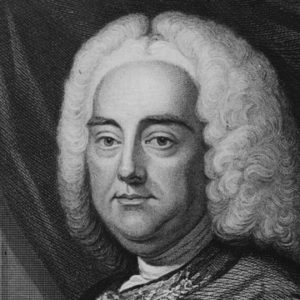From: San Francisco Classical Voice
Born in Germany and trained in Italy, Handel immigrated to London and became one of the most celebrated composers in English history.

Vital Statistics
Born: Feb. 23, 1685 in Halle, Saxony (Germany)
Died: Apr. 14, 1759 in London
Nationality: German
Genre: Baroque
Performed as: Harpsichordist, organist, and violinist
During the composer’s lifetime: War of the Austrian Succession; the Seven Years’ war raged; Italian opera rises and falls on the London stage, as new standards of realism make London famous for its theater scene.
biographical outline
- Training: The Duke of Saxe-Weissenfels, hears the nine-year old Handel play organ and convinces the composer’s father to allow the boy to continue in music. Later, Handel studies with Giovanni Bononcini, one of the most successful opera composers of his generation.
- First gig, 1703-4: Handel moves to Hamburg to play violin in the opera orchestra. The next year, the director of the Hamburg Opera skips town, and the interim manager gives Handel his first opera commission, Almira. It was a success.
- The grand tour, 1706-1709: On an extensive tour of Italy he forms close associations with powerful men in Italian culture: the Medicis, and the famous Cardinals Ottoboni, Pamphili, Colonna, and Ruspoli. Under their patronage, Handel composes hundreds of cantatas. The Venetian production of Agrippina secures Handel an international reputation.
- Chapel master, 1710: Handel becomes Kapellmeister for George, Elector of Hanover. His salary is huge: 1,000 thaler annually, compared with that of J.S. Bach that same year: 175 thaler annually!
- New horizons, 1711: Handel spends much time in London, where he makes a big splash, composing the first Italian opera specifically written for London, Rinaldo. This feat lays the foundation for his future career.
- One step back, 1713: Handel is fired from his post in Hanover, but there were no hard feelings. When George of Hanover becomes King George I of England in 1714, Handel receives his back salary, and resumes his role as the King’s favored composer, moving to England for good. He officially anglicizes his name (Georg Friedrich to George Frideric), and later becomes a naturalized British citizen.
- Water Music, 1717: Handel composes one of his most famous orchestral compositions, the Water Music, for a royal barge trip down the Thames. Legend states that the music delighted the King so much that he asked for it to be played three times.
- Social climber, 1717: Handel entered the service of the Duke of Chandos, composing an early version of Esther, the first oratorio ever written in English.
- Opera and drama, 1719-1728: The Royal Academy of Music is established for the promotion of opera in London. Handel travels Europe to recruit singers, and manages to hire two top-ranked castrati, as well as two famous Italian sopranos. All goes well, until their demands start breaking the bank. The Academy is kept afloat by royal intercession, but people grumble about wasting taxpayer dollars on frivolous enterprises. John Gay’s Beggar’s Opera (1728) famously lampoons these problems and becomes one of the most celebrated English stage works in history.
- A new direction, 1738-1759: Challenged on the stage by a rival opera company in 1736, Handel begins to present oratorios – musically similar to operas, but with religious texts and no staged action – and in 1741 he gives up opera altogether. In this period, Handel produces some of the most beloved oratorios in the entire repertory: Saul and Israel in Egypt (both 1739), and Messiah (1742). The London performances of Messiah, while causing some scandal, help establish Handel as the most celebrated composer in English history.
